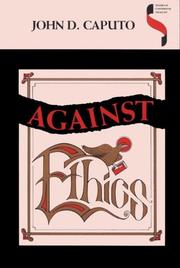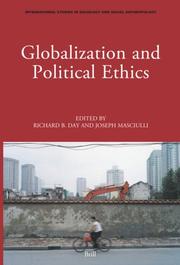| Listing 1 - 10 of 21 | << page >> |
Sort by
|
Book
ISBN: 8494737627 9788494737626 Year: 2017 Publisher: Barcelona Antoni Bosch editor
Abstract | Keywords | Export | Availability | Bookmark
 Loading...
Loading...Choose an application
- Reference Manager
- EndNote
- RefWorks (Direct export to RefWorks)
Book
ISBN: 8490851077 9788490851074 9788490850541 Year: 2014 Publisher: Madrid : Dykinson,
Abstract | Keywords | Export | Availability | Bookmark
 Loading...
Loading...Choose an application
- Reference Manager
- EndNote
- RefWorks (Direct export to RefWorks)
Publicidad --- Ética profesional --- Aspetos morales --- Aspectos éticos --- Libros electrónicos
Book
ISBN: 8431325798 9788431325794 Year: 2008 Publisher: Pamplona: Eunsa,
Abstract | Keywords | Export | Availability | Bookmark
 Loading...
Loading...Choose an application
- Reference Manager
- EndNote
- RefWorks (Direct export to RefWorks)
Ética --- Filosofía de la naturaleza --- Medieval --- Tomás, Aquino, - Santo, - 1225-1274 --- Cicerón, Marco Tulio

ISBN: 0585105596 9780585105598 9780253114877 025311487X 0253313139 0253208165 9780253313133 9780253208163 Year: 1994 Publisher: Bloomington, Ind. Indiana University Press
Abstract | Keywords | Export | Availability | Bookmark
 Loading...
Loading...Choose an application
- Reference Manager
- EndNote
- RefWorks (Direct export to RefWorks)
Ethics --- Deontology --- Ethics, Primitive --- Ethology --- Moral philosophy --- Morality --- Morals --- Philosophy, Moral --- Science, Moral --- Philosophy --- Values --- Ethics. --- General ethics --- Postmodernismo. --- Ética.
Book
ISBN: 9788490850497 8490850496 9788490850411 8490850410 Year: 2014 Publisher: Madrid : Dykinson,
Abstract | Keywords | Export | Availability | Bookmark
 Loading...
Loading...Choose an application
- Reference Manager
- EndNote
- RefWorks (Direct export to RefWorks)
Motion pictures and language. --- Values. --- Cine --- Valores (Ética) --- Axiology --- Worth --- Aesthetics --- Knowledge, Theory of --- Metaphysics --- Psychology --- Ethics --- Language and motion pictures --- Language and languages --- Lenguaje.
Book
Year: 2022 Publisher: Medellín : Fondo Editorial Universidad Católica Luis Amigó,
Abstract | Keywords | Export | Availability | Bookmark
 Loading...
Loading...Choose an application
- Reference Manager
- EndNote
- RefWorks (Direct export to RefWorks)
The analysis experience starts from the fact that the symptom is presented as something in the body that demands an interpretation. There it is inevitable to lead to a judgment about the most intimate thing that lives in each of us; the unveiling of what consciousness would have preferred to reject. At this point, the body, ethics, and tragedy coincide.It is, then, a journey that starts from the question about the points of encounter and disagreement between philosophy and psychoanalysis concerning ethics, tragedy, and the body as a third party that knots said reflection. The relationship between authors such as Aristotle, Nietzsche, Freud, and Lacan is proposed to reach the specifics of the theoretical elaboration of psychoanalysis, finding there the body as an effect of language and, therefore, with a structure marked by the ineffable that is the cause of the symptom. La experiencia de un análisis parte del hecho de que el síntoma se presenta como algo en el cuerpo que demanda una interpretación. Allí es inevitable desembocar en un juicio sobre lo más íntimo que habita en cada uno de nosotros; el develamiento de aquello que la consciencia habría preferido rechazar. Es en este punto donde el cuerpo, la ética y la tragedia coinciden.Se trata, entonces de un recorrido que parte de la pregunta sobre los puntos de encuentro y desencuentro entre la filosofía y el psicoanálisis respecto a la ética, la tragedia y el cuerpo como tercero que anuda dicha reflexión. Se plantea la relación entre autores como Aristóteles, Nietzsche, Freud y Lacan para llegar a lo específico de la elaboración teórica del psicoanálisis, encontrando allí el cuerpo como un efecto de lenguaje y, por ende, con una estructura marcado por lo inefable que es causa del síntoma.
Humanities --- Colombia --- Filosofía --- Psicoanálisis --- Ética psicoanalítica --- Ética (Psicoanálisis) --- Literatura --- Mente y cuerpo (Psicoanálisis) --- Psicoanálisis. --- Tragedia (Psicoanálisis) --- Investigaciones. --- Filosofía. --- Aristóteles --- Freud, Sigmund, --- Lacan, Jacques, --- Nietzsche, Friedich Wilhelm, --- Crítica e interpretación.
Book
Year: 2022 Publisher: Medellín : Fondo Editorial Universidad Católica Luis Amigó,
Abstract | Keywords | Export | Availability | Bookmark
 Loading...
Loading...Choose an application
- Reference Manager
- EndNote
- RefWorks (Direct export to RefWorks)
The analysis experience starts from the fact that the symptom is presented as something in the body that demands an interpretation. There it is inevitable to lead to a judgment about the most intimate thing that lives in each of us; the unveiling of what consciousness would have preferred to reject. At this point, the body, ethics, and tragedy coincide.It is, then, a journey that starts from the question about the points of encounter and disagreement between philosophy and psychoanalysis concerning ethics, tragedy, and the body as a third party that knots said reflection. The relationship between authors such as Aristotle, Nietzsche, Freud, and Lacan is proposed to reach the specifics of the theoretical elaboration of psychoanalysis, finding there the body as an effect of language and, therefore, with a structure marked by the ineffable that is the cause of the symptom. La experiencia de un análisis parte del hecho de que el síntoma se presenta como algo en el cuerpo que demanda una interpretación. Allí es inevitable desembocar en un juicio sobre lo más íntimo que habita en cada uno de nosotros; el develamiento de aquello que la consciencia habría preferido rechazar. Es en este punto donde el cuerpo, la ética y la tragedia coinciden.Se trata, entonces de un recorrido que parte de la pregunta sobre los puntos de encuentro y desencuentro entre la filosofía y el psicoanálisis respecto a la ética, la tragedia y el cuerpo como tercero que anuda dicha reflexión. Se plantea la relación entre autores como Aristóteles, Nietzsche, Freud y Lacan para llegar a lo específico de la elaboración teórica del psicoanálisis, encontrando allí el cuerpo como un efecto de lenguaje y, por ende, con una estructura marcado por lo inefable que es causa del síntoma.
Colombia --- Filosofía --- Psicoanálisis --- Ética psicoanalítica --- Ética (Psicoanálisis) --- Literatura --- Mente y cuerpo (Psicoanálisis) --- Psicoanálisis. --- Tragedia (Psicoanálisis) --- Investigaciones. --- Filosofía. --- Aristóteles --- Freud, Sigmund, --- Lacan, Jacques, --- Nietzsche, Friedich Wilhelm, --- Crítica e interpretación.
Book
Year: 2022 Publisher: Medellín : Fondo Editorial Universidad Católica Luis Amigó,
Abstract | Keywords | Export | Availability | Bookmark
 Loading...
Loading...Choose an application
- Reference Manager
- EndNote
- RefWorks (Direct export to RefWorks)
The analysis experience starts from the fact that the symptom is presented as something in the body that demands an interpretation. There it is inevitable to lead to a judgment about the most intimate thing that lives in each of us; the unveiling of what consciousness would have preferred to reject. At this point, the body, ethics, and tragedy coincide.It is, then, a journey that starts from the question about the points of encounter and disagreement between philosophy and psychoanalysis concerning ethics, tragedy, and the body as a third party that knots said reflection. The relationship between authors such as Aristotle, Nietzsche, Freud, and Lacan is proposed to reach the specifics of the theoretical elaboration of psychoanalysis, finding there the body as an effect of language and, therefore, with a structure marked by the ineffable that is the cause of the symptom. La experiencia de un análisis parte del hecho de que el síntoma se presenta como algo en el cuerpo que demanda una interpretación. Allí es inevitable desembocar en un juicio sobre lo más íntimo que habita en cada uno de nosotros; el develamiento de aquello que la consciencia habría preferido rechazar. Es en este punto donde el cuerpo, la ética y la tragedia coinciden.Se trata, entonces de un recorrido que parte de la pregunta sobre los puntos de encuentro y desencuentro entre la filosofía y el psicoanálisis respecto a la ética, la tragedia y el cuerpo como tercero que anuda dicha reflexión. Se plantea la relación entre autores como Aristóteles, Nietzsche, Freud y Lacan para llegar a lo específico de la elaboración teórica del psicoanálisis, encontrando allí el cuerpo como un efecto de lenguaje y, por ende, con una estructura marcado por lo inefable que es causa del síntoma.
Humanities --- Filosofía --- Psicoanálisis --- Ética psicoanalítica --- Colombia --- Ética (Psicoanálisis) --- Literatura --- Mente y cuerpo (Psicoanálisis) --- Psicoanálisis. --- Tragedia (Psicoanálisis) --- Investigaciones. --- Filosofía. --- Aristóteles --- Freud, Sigmund, --- Lacan, Jacques, --- Nietzsche, Friedich Wilhelm, --- Crítica e interpretación.
Periodical
ISSN: 2229578X Year: 2010 Publisher: Barcelona : Ramon Llull University : Prohom Edicons S.L.,
Abstract | Keywords | Export | Availability | Bookmark
 Loading...
Loading...Choose an application
- Reference Manager
- EndNote
- RefWorks (Direct export to RefWorks)
Applied ethics --- Ética. --- Practical ethics --- Filosofía moral --- Moral --- Moralidad --- Filosofía --- Deontología --- Ética ambiental --- Ética comparada --- Ética comunista --- Ética feminista --- Ética militar --- Ética política --- Ética religiosa --- Ética sexual --- Ética social --- Desarrollo moral --- Humanitarismo --- Derecho y moral --- Educación moral --- Literatura y moral --- Misericordia --- Moral práctica --- Religión y moral --- Valores (Filosofía) --- Ethics --- Casuistry --- Ethical problems --- Ética. --- Applied ethics.

ISBN: 1281458155 9786611458157 9047411757 9789047411758 9789004155817 9004155813 9781281458155 6611458158 Year: 2007 Publisher: Leiden Boston Brill
Abstract | Keywords | Export | Availability | Bookmark
 Loading...
Loading...Choose an application
- Reference Manager
- EndNote
- RefWorks (Direct export to RefWorks)
Rational exercise of our responsibility requires us to relate the globalization process to the ends and purposes that properly befit human life and human community. Economic 'ends' are merely the 'means' to ends of a higher order, which can only be specified in terms of moral duty and ethical purpose. The contributors to this book explore political-ethical issues of globalization, including terrorism, institutional change and distribution in the world economy, the role of the United Nations and international financial institutions, the regimes of international trade and technology transfer, the effects of regionalism in the European Union and the Association of Southeast Asian Nations, the failure of Russia, human rights enforcement in Africa, and the prospects for global governance. This book was originally published as Volume 4 numbers 3-4 (2005) of Brill's journal Perspectives on Global Development and Technology .
Internationalisatie. --- Politieke ethiek. --- Globalization --- Political ethics. --- Globalización --- Ética política. --- Ethics, Political --- Ethics in government --- Government ethics --- Political science --- Politics, Practical --- Ethics --- Civics --- Economic aspects. --- Moral and ethical aspects. --- Aspectos económicos. --- Aspectos morales y éticos. --- Moral and ethical aspects
| Listing 1 - 10 of 21 | << page >> |
Sort by
|

 Search
Search Feedback
Feedback About UniCat
About UniCat  Help
Help News
News